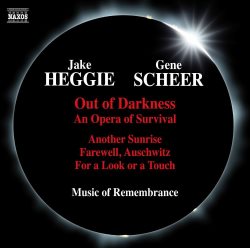| 
|
Jake HEGGIE (b. 1961)
Out of darkness
Another sunrise (2012) [28.33]
Farewell, Auschwitz (2013) [27.43]
For a look or a touch (2007, revised 2014) [22.28]
Caitlin Lynch (soprano: Sunrise, Farewell), Sarah Larsen (mezzo: Farewell), Morgan Smith (baritone: Farewell, Look)
Music of Remembrance/Mina Miller
rec. Illsley Hall, Nordstrom Recital Hall, Benaroya Hall, Seattle, 16-17 May 2012 (Sunrise) and 16-17 May 2013
full texts provided in booklet and online
NAXOS 8.559770 [78.44]
This disc is described on the front cover — although nowhere else in the documentation, as far as I can see — as “an opera of survival”. This would appear at first sight to put it in the same category as Jake Heggie’s other large-scale successful operas of recent years.
Equal credit and billing are given to the writer of the text, Gene Scheer (born 1958); but in the event only one of the three works on this disc is actually an operatic piece, the monodrama Another sunrise. The other two items are essentially song cycles, although with a decidedly dramatic element and a thematic link to the monodrama provided by the theme of the Holocaust. It is therefore not unfair or inappropriate to regard the three world première recordings here as part of a unified trilogy under the overarching title Out of darkness.
Works which treat of the horror of the Holocaust are nothing new. Those here “were commissioned by Music of Remembrance, a Seattle-based organisation dedicated to remembering the Holocaust through music.” The style of Heggie’s music is not unfamiliar to listeners nowadays. The opening of Another source seems to inhabit the world of Gorecki’s Third Symphony — to cite another work about the Holocaust. However there is plenty of dramatic contrast as well, together with musical reminiscences of Strauss, Liszt and Chopin at various points throughout the trilogy. The action of Another source is slightly reminiscent of Poulenc’s Le voix humaine. Here the solo soprano is not alone with a telephone, but with a tape machine which she turns on and off at appropriate dramatic moments. The music of Farewell, Auschwitz has – as Heggie acknowledges in his booklet note – the not inappropriate cabaret feel of Kurt Weill. The upbeat song about the typist Miss Ziutka (track 7) has an aura of gallows humour, to which the following The sun and the skylark (track 8) provides a heart-rending contrast. The final song is almost triumphant in the manner of Weill’s Mahagonny.
The final song cycle, For a look or a touch, is a revision of an earlier work and Heggie’s style here is more austere in a series of poems dealing with the Nazi persecution of homosexuals. The texts are more harrowing in their graphic descriptions of the torments suffered by the victims, rendered even more horrendous by Mina Miller’s comment that many were unable to speak openly of their treatment after the War because of the continuing illegality of homosexuality in Germany until 1970. The vocal line is more angular, including some elements of speech as well as allusions to Berlin cabaret music as before. The song A hundred thousand stars (track 12), added in the revision, gives some lyrical relief. The Weill-like melodic line is very beautiful indeed; the conductor’s note describes it correctly as “emotionally gripping”. One would like to hear the version for male choir that Heggie wrote for the Seattle Men’s Chorus, although that is not to decry the work of Morgan Smith who sings it with great feeling here.
Naxos are to be congratulated for not only providing the complete texts online but also within the CD booklet, along with full biographical notes and descriptions of the music by the composer, librettist and conductor. In these days when so many record companies releasing material at bargain price cut back supporting material to the bare minimum, this sort of presentation – so essential for the understanding of unfamiliar music – is welcome indeed. It shows what can and should be done. The singers are expressive, accurately toned and dramatically effective even when their delivery of the texts is not always totally clear. The accompaniment is for chamber forces only – variously flute, clarinet, violin, cello, double-bass and piano – but provide plenty of contrast and indeed weight where required. The piano part is taken by an artist of the calibre of Craig Sheppard who blends perfectly into the whole without any hint of star billing.
Those, like myself, who have found Heggie’s Dead man walking and Moby Dick impressive statements of music theatre, will relish the thought of this disc. They will not be unrewarded. Those who are still unfamiliar with the composer’s work may prefer to approach it through one or another of his larger-scale pieces. Despite its horrendous title Farewell, Auschwitz is music which should have immediate appeal. The whole should also make the listener consider the essential banality of evil, which led many of the Nazi persecutors not just to follow orders blindly but then to seek to rationalise their actions as being “the right thing to do”.
Paul Corfield Godfrey
 |
 |
|



 All Nimbus reviews
All Nimbus reviews








